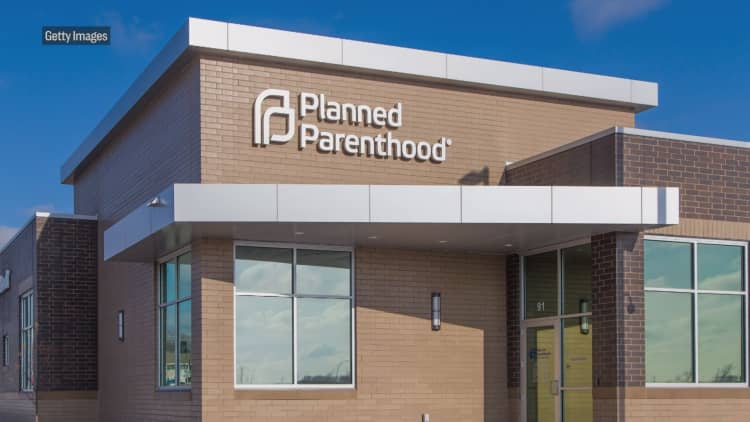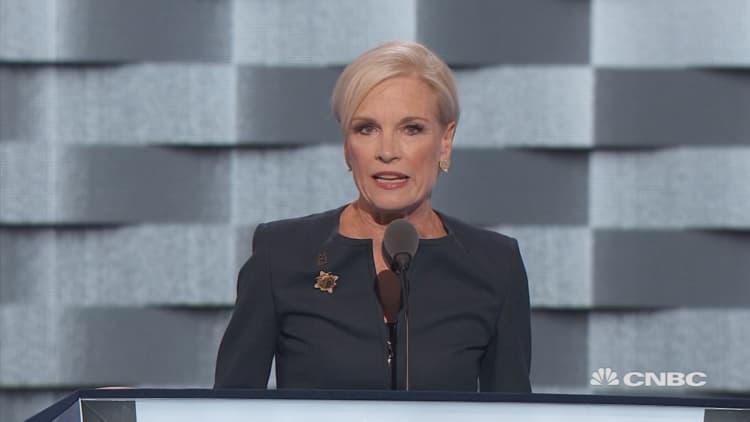The Supreme Court announced Monday that it would not hear two cases brought by states seeking to bar Planned Parenthood from receiving Medicaid funding, as Republican-appointed justices John Roberts and Brett Kavanaugh sided with their liberal colleagues.
The court rejected appeals from Kansas and Louisiana, which sought to overturn federal appeals court rulings barring them from cutting off the medical provider's funding. The court's order announcing its decision not to hear the cases does not list how each of the justices voted.
But Justice Clarence Thomas dissented from the decision. He was joined by fellow conservatives Justices Neil Gorsuch and Samuel Alito. Four justices must agree to take up a case in order for the court to hear it. The court would have taken up the case had either Kavanaugh or Roberts, the chief justice, wanted to do so.
Kavanaugh's decision is particularly notable. Anti-abortion groups celebrated his confirmation in October and many assumed his ascension to the bench would solidify a conservative majority that would take on abortion rights. The cases the court declined to hear Monday did not directly concern the legality of abortion, though Planned Parenthood is a frequent target of lawmakers who oppose it. In his dissent, Thomas said his colleagues' decision was rooted in the abortion issue though the cases themselves were not.

The cases stemmed from controversial videos released in 2015 by the anti-abortion group Center for Medical Progress.
The videos purported to reveal that Planned Parenthood was trafficking tissue from aborted fetuses, though investigations by Congress later cleared the group. Planned Parenthood has said that the videos were heavily edited and misleading. Those videos prompted a number of governors, including former Louisiana Gov. Bobby Jindal and former Kansas Gov. Sam Brownback, to block Medicaid funding for the group.
Congress has prohibited the use of federal funds to pay for abortion, though Planned Parenthood receives government funding, largely through Medicaid, for other services it provides, such as cancer screenings and birth control.
In February, the 10th Circuit U.S. Court of Appeals, which has jurisdiction over Kansas, reasoned that states cannot cut off a provider's funding for reasons "unrelated to the provider's competence and the quality of the health care it provides."
A panel of the 5th Circuit Court of Appeals, which has jurisdiction over Louisiana, reached a similar conclusion last year, and a later hearing by the full appeals court reached a 7-7 tie on the matter.
Following Monday's announcement from the Supreme Court, both circuits' restrictions on a state's ability to limit Medicaid funding will stand.
In his dissent, Thomas wrote that the question before the court "has nothing to do with abortion." He said he would have taken up the case in order to resolve a circuit split over whether Medicaid recipients have the right to challenge a state's determination of what makes a medical provider "qualified."
"Some tenuous connection to a politically fraught issue does not justify abdicating our judicial duty," he wrote.

Planned Parenthood declared victory following the announcement. In a tweet, the group's political arm wrote that the "decision protects Medicaid patients who rely on Planned Parenthood for birth control, cancer screenings, and STD testing and treatment."
But anti-abortion groups vowed to keep fighting, and a number of challenges to abortion providers remain. In a statement, Americans United for Life President Catherine Glenn Foster said she was "disappointed" by the court's decision, but "the good news is that there are other similar cases pending in lower courts, which may give the Supreme Court another opportunity to decide this important issue."
The GOP has made limiting abortion access a priority. Republican-dominated legislatures throughout the country have imposed regulations limiting the ability of medical facilities to provide abortion services. On the campaign trail in 2016, Trump vowed to appoint justices who would "automatically" overturn the landmark abortion ruling Roe v. Wade.


